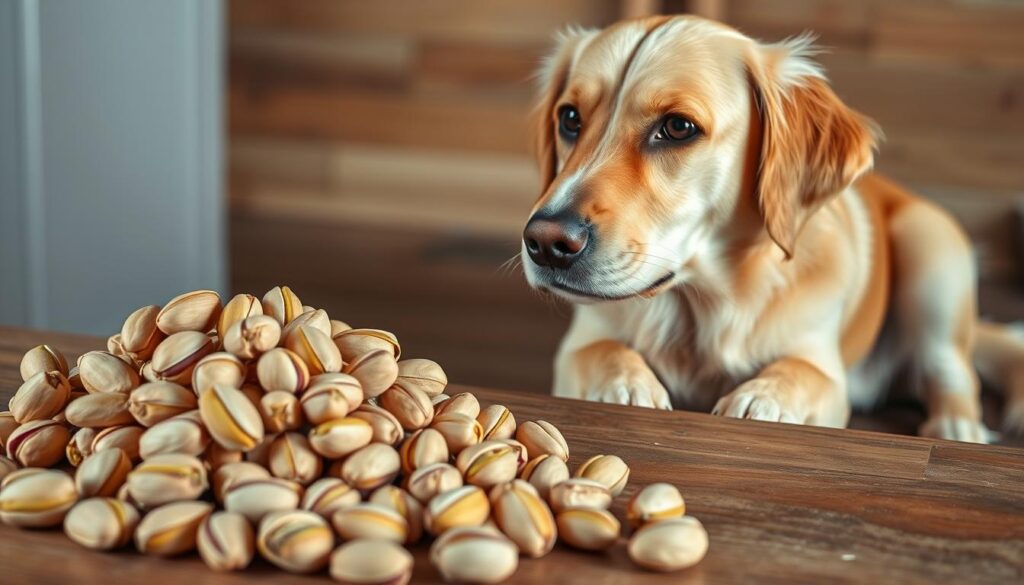Table of Contents
Pistachio for Dogs
As a devoted dog parent, I’ve always wondered if I should share my favorite snacks with my furry friend. The world of pistachios for dogs is both fascinating and confusing. It’s not just about treating your pup; it’s about keeping them safe and healthy.
Nuts have long been a topic of debate in canine nutrition. When it comes to pistachios, pet owners have many questions about safety, nutrition, and potential risks. This guide will help you understand if dogs can eat pistachios, ensuring you make the best choices for your dog’s diet.
Every dog is different, and what works for one might not work for another. It’s important to be cautious, do research, and get professional advice before introducing new foods. Our detailed exploration will give you insights into the nutritional value, health benefits, and precautions of pistachios for your dog.
Key Takeaways
- Pistachios require careful consideration before feeding to dogs
- Nutritional benefits exist but come with potential risks
- Portion control is critical for dog health
- Always consult with a veterinarian before introducing new foods
- Watch for potential allergic reactions
What Are Pistachios?
Pistachios are special nuts full of good stuff that people who care about health like. They are green and come from the Pistacia vera tree. They have a mix of nutrients that might help dogs.
Nutritional Benefits of Pistachios
Pistachios are packed with nutrients that could help dogs stay healthy. They have:
- High protein content
- Essential healthy fats
- Vitamins like B6 and E
- Minerals such as potassium and magnesium
How Pistachios Are Processed
Pistachios go from tree to table in a special way. Farmers pick them when they naturally open. Are pistachios safe for dogs? How they’re processed affects their safety and health value.
| Processing Stage | Description |
|---|---|
| Harvesting | Collected when shells naturally split |
| Cleaning | Removing debris and foreign materials |
| Roasting | Optional heat treatment for flavor |
| Packaging | Sealed to maintain freshness |
Potential Risks of Pistachios
Pistachios have good stuff, but they also have risks for dogs. They have a lot of fat and might have aflatoxins. Always talk to a vet before giving new foods to your dog.
Remember, moderation and careful preparation are key when considering pistachios for your canine companion.
Can Dogs Eat Pistachios?
Dog owners often wonder if it’s safe to share human snacks with their pets. Pistachios are a tricky case that needs careful thought.
Yes, dogs can eat pistachios, but with great caution. They can have a few in very small amounts. But, the risks are often too high.
Factors to Consider Before Feeding
Before giving pistachios to your dog, consider these important points:
- Dog’s overall health status
- Existing digestive sensitivities
- Weight and size of the dog
- Potential allergic reactions
Recommended Serving Sizes
It’s vital to control how much pistachio your dog eats. Small amounts help avoid stomach problems.
| Dog Size | Maximum Safe Portion |
|---|---|
| Small Breeds | 1-2 unsalted pistachios |
| Medium Breeds | 2-3 unsalted pistachios |
| Large Breeds | 3-4 unsalted pistachios |
Always remove pistachio shells completely to prevent choking hazards or intestinal blockages. Choose unsalted, raw pistachios. But give them out sparingly.
Professional vets say to talk to your vet before adding new foods, like nuts, to your dog’s diet.
Health Benefits of Pistachios for Dogs
Looking into pistachios for dogs shows they might be good for them. But, it’s important to give them in small amounts. Pistachios have special nutrients that could help your dog feel better.
Antioxidants and Healthy Fats
Pistachios are full of antioxidants that help keep your dog’s cells healthy. They have important nutrients that fight off harmful free radicals and might lower inflammation. Here are some benefits of pistachios for dogs:
- Vitamin E protects cell membranes
- Less oxidative stress
- Supports the immune system
Heart Health Support
Pistachios have healthy fats that are good for your dog’s heart. Unsaturated fats can help keep cholesterol levels in check and support heart health. These fats help with better blood flow and might lower heart risks.
Improved Digestive Health
Pistachios can also help with digestion when given in small amounts. They have natural fiber that aids in digestion, which can improve gut health and help with regular bowel movements. The benefits include:
- Better nutrient absorption
- Improved gut microbiome balance
- Potential relief from minor digestive issues
Always talk to your vet before adding pistachios or any new food to your dog’s diet.
Risks Associated with Feeding Dogs Pistachios
Pistachios might look like a tasty snack, but they can be harmful to dogs. It’s important to know the risks before giving them to your pet.
High Fat Content Explained
Pistachios have a lot of fat, which is bad for dogs. Vets often warn against giving them pistachios because of this. Too much fat can cause serious problems like:
- Pancreatitis
- Rapid weight gain
- Digestive system stress
- Potential obesity
Possible Aflatoxin Contamination
A big risk with pistachios is aflatoxin contamination. These toxins can grow on nuts and harm dogs. They can cause serious health issues.
| Aflatoxin Exposure Level | Potential Dog Health Risks |
|---|---|
| Low Exposure | Mild digestive upset |
| Moderate Exposure | Liver damage |
| High Exposure | Potential liver failure |
Allergic Reactions in Dogs
Dogs can also be allergic to pistachios, just like people. Some dogs might develop immediate sensitivities that show up as:
- Skin irritation
- Excessive itching
- Gastrointestinal distress
- Respiratory difficulties
Always talk to your vet before adding new foods to your dog’s diet. This is especially true for risky treats like pistachios.
Signs of Pistachio Allergies in Dogs
It’s important for pet owners to know about pistachio poisoning in dogs. Pistachios might seem safe, but they can cause serious allergies in some dogs.
Knowing the signs of pistachio allergies is key. Not all dogs react the same way. But, some symptoms can show if a dog is allergic.
Common Symptoms to Watch For
- Persistent vomiting
- Diarrhea or loose stools
- Excessive scratching or skin irritation
- Swelling around the face or mouth
- Difficulty breathing
- Sudden lethargy or weakness
What to Do if Your Dog Is Allergic
If your dog shows signs of an allergic reaction after eating pistachios, act fast. Remove any remaining nuts and watch your pet closely. Give them fresh water and try to keep them calm.
When to Consult a Veterinarian
Some allergic reactions can get worse fast. Call your vet right away if you see:
- Persistent vomiting for more than 24 hours
- Signs of extreme distress
- Difficulty breathing
- Significant changes in behavior
Getting professional help is crucial. It can stop serious problems from pistachio poisoning and keep your pet safe.
How to Safely Introduce Pistachios to Your Dog
Introducing pistachios to dogs needs careful planning. It’s important to know your pet’s needs. This way, you can safely give them pistachios.

Veterinary nutritionists suggest a careful approach. They want to balance the risks with possible benefits.
Start with Small Portions
Here are key steps to introduce pistachios:
- Start with a tiny amount (no more than a single pistachio)
- Choose unsalted, plain pistachios
- Remove the shell completely before offering
- Crush or chop the pistachio into small pieces
Monitor Your Dog’s Reaction
It’s important to watch how your dog reacts. Look for these signs:
| Positive Reactions | Negative Reactions |
|---|---|
| Normal digestion | Vomiting |
| No stomach upset | Diarrhea |
| Maintained energy | Lethargy |
Gradually Increase Serving Size
If your dog does well with pistachios, you can give more. Remember, pistachios should never replace regular dog food.
“Moderation is key when introducing any new food to your dog’s diet.” – Veterinary Nutrition Expert
Don’t give pistachios more than 10% of your dog’s daily calories. Always talk to your vet before changing your dog’s diet.
Safe Preparation Methods for Dogs
Preparing pistachio nuts for dogs needs careful steps. While pistachios can be tasty, it’s key to prepare them right to keep your dog safe and healthy.
Understanding the best ways to prepare pistachios for dogs can greatly improve their eating experience.
Raw Vs. Roasted Pistachios: What’s Best for Your Dog?
Choosing between raw and roasted pistachios is important. Here are some key points to consider:
- Raw pistachios have more moisture
- Roasted pistachios are safer from bacteria
- Always pick unsalted pistachios for dogs
Removing Pistachio Shells: Critical Safety Step
Pistachio shells and dogs don’t go well together. It’s crucial to remove the shells to avoid health risks.
| Shell Risks | Potential Consequences |
|---|---|
| Choking Hazard | Immediate blockage of airway |
| Digestive Obstruction | Potential intestinal damage |
| Sharp Edges | Internal scratching or punctures |
To safely prepare pistachios for your dog, follow these steps:
- Choose unsalted, plain pistachios
- Remove shells completely
- Break nuts into small, manageable pieces
- Offer in minimal quantities
Pro tip: When in doubt, talk to your vet about adding pistachio nuts to your dog’s diet.
Alternative Nut Options for Dogs
Looking for nuts safe for dogs besides pistachios? It’s important to think about their nutritional value and risks. Not all nuts are good for your dog. Knowing which ones are best helps you choose the right food for your pet.
Almonds: Proceed with Caution
Almonds aren’t toxic to dogs, but they’re hard to digest. They can cause serious stomach problems. Their high fat and choking risk make them a bad choice for dogs.
- Large size can cause throat blockage
- High fat content may lead to pancreatitis
- Difficult to chew and digest
Peanuts: A Safer Alternative
Peanuts are a better choice for dogs. Unsalted, raw, or dry-roasted peanuts can be a treat. They have protein and healthy fats, but only in small amounts. Make sure to remove the shell to avoid digestive issues.
Cashews: Limited Treat Potential
Cashews can be given to dogs, but only a little. They have good nutrients but also risks. Plain, unsalted cashews might be okay, but they shouldn’t replace your dog’s regular food.
Always consult your veterinarian before introducing new foods into your dog’s diet.
Remember, nuts should be given in small amounts. Most vets say nuts should be treats, not part of your dog’s regular diet. Your dog’s main food should always be balanced, vet-approved dog food.
Recommended Dog Treats with Pistachios
Looking for pistachio treats for dogs needs careful thought. Pistachios can be a fun snack sometimes. But, it’s important to pick treats that are good for your dog’s health and taste.

When you’re searching for pistachio treats, look for both store-bought and homemade ones. Make sure they are safe and healthy for your dog.
Commercial Treats That Are Safe
Not all dog treats with pistachios are the same. Here’s what to look for:
- Minimal pistachio content
- No added salt or artificial preservatives
- Veterinarian-approved ingredients
- Organic, human-grade nuts
“Always check ingredient labels carefully before giving your dog any new treat.” – Veterinary Nutrition Experts
DIY Recipes for Homemade Treats
Making your own pistachio treats lets you pick the ingredients. Here’s a simple recipe:
- Crush unsalted, raw pistachios
- Mix with plain Greek yogurt
- Form small bite-sized balls
- Freeze for 1 hour before serving
Pro tip: Start with small amounts of pistachios for your dog. Watch for any bad reactions.
Frequently Asked Questions About Pistachios
Dog owners often wonder if pistachios are safe for their pets. Knowing the details about pistachios and dogs can guide your choices for your dog’s food.
Can Puppies Eat Pistachios?
Puppies need special care with their food because their stomachs are very sensitive. Pistachios are not harmful, but they’re not good for young dogs. Vets say no to pistachios for puppies for a few important reasons:
- They have too much fat, which can upset a puppy’s stomach.
- The shells can be a choking hazard.
- They might cause problems with digestion.
- They add extra calories that puppies don’t need.
How Often Can I Give My Dog Pistachios?
When thinking about giving pistachios to dogs, remember to keep it small. Most vets agree on a few things:
- Give pistachios as rare treats.
- Only give 1-2 unsalted, shelled pistachios a week.
- Watch your dog for any bad reactions.
Pro tip: Always talk to your vet before adding new foods to your dog’s diet, especially pistachios.
Conclusion: Should You Feed Your Dog Pistachios?
Thinking about adding pistachios to your dog’s diet is a big decision. These nuts have some good points, but they also have risks. It’s important to weigh these carefully.
Vets say to be careful with pistachios for dogs. It’s all about knowing your dog’s health needs and any allergies they might have.
Weighing the Pros and Cons
Before giving pistachios to your dog, think about these things:
- Nutritional value of pistachios
- Potential digestive risks
- Individual dog health conditions
- Portion control recommendations
Making Informed Dietary Choices
“Your dog’s health is a partnership between you and your veterinarian.” – Canine Nutrition Experts
Here’s what you should do:
- Consult with your vet
- Watch how your dog reacts to new foods
- Choose unsalted pistachios of high quality
- Only give pistachios as rare treats
Remember, moderation and professional advice are key when adding new foods to your dog’s diet.
Resources for Dog Owners
Exploring dog nutrition can be tough, especially with topics like pistachios for dogs. This article is just the start of learning about safe nuts for your pet. It’s a journey to understand how these can affect your dog’s diet.
Veterinary resources are key for learning about dog food. The American Veterinary Medical Association (AVMA) has detailed guides on what pets need to eat. Sites like VetStreet and PetMD have expert articles. They help you decide if pistachios are good for your dog’s meals.
Online communities are great for getting real advice from other pet owners. Places like Reddit’s r/dogs and Facebook groups focused on dog food are full of helpful tips. You can learn from others who have tried different nuts with their dogs.
But remember, online advice is not a substitute for a vet’s opinion. Always talk to your vet before changing your dog’s diet, especially with new foods like pistachios. Every dog is different, and they need advice tailored to their health.
FAQ
Can dogs eat pistachios safely?
Pistachios are not toxic to dogs, but they’re not safe either. They have a lot of fat, which is bad for dogs. Always talk to your vet before giving your dog new foods.
What are the potential health risks of feeding pistachios to dogs?
Pistachios can harm dogs in many ways. They might cause pancreatitis because of the fat. There’s also a risk of poisoning from aflatoxins. Shells can get stuck in their throats, and eating too many can lead to obesity and stomach problems.
How many pistachios can I safely give my dog?
It’s best to avoid giving pistachios to dogs. If you must, give only 1-2 unsalted, shelled pistachios to big dogs. Give even fewer to small dogs. But, the dangers are usually greater than any benefits.
What should I do if my dog accidentally eats pistachios?
Watch your dog for signs of upset stomach, like vomiting or diarrhea. If they eat a lot of pistachios or seem sick, call your vet right away.
Are pistachio shells dangerous for dogs?
Yes, pistachio shells are very dangerous. They can block their intestines, cause internal injuries, and are a choking hazard. Make sure to remove all shells and keep them away from dogs.
Can puppies eat pistachios?
No, puppies should never have pistachios. Their digestive systems are still growing, and pistachios can be very harmful. They have too much fat and can contain toxins.
Are there any dog-friendly alternatives to pistachios?
Yes, there are safer options. You can give plain, unsalted almonds in small amounts. Or, better yet, ask your vet for dog-specific treats. Fruits and veggies are also good and safer for dogs.
Can pistachios cause allergic reactions in dogs?
Yes, dogs can be allergic to pistachios. Symptoms include skin problems, stomach issues, breathing troubles, and in severe cases, anaphylaxis. Always be careful when introducing new foods and watch for any bad reactions.
There are no reviews yet. Be the first one to write one.

